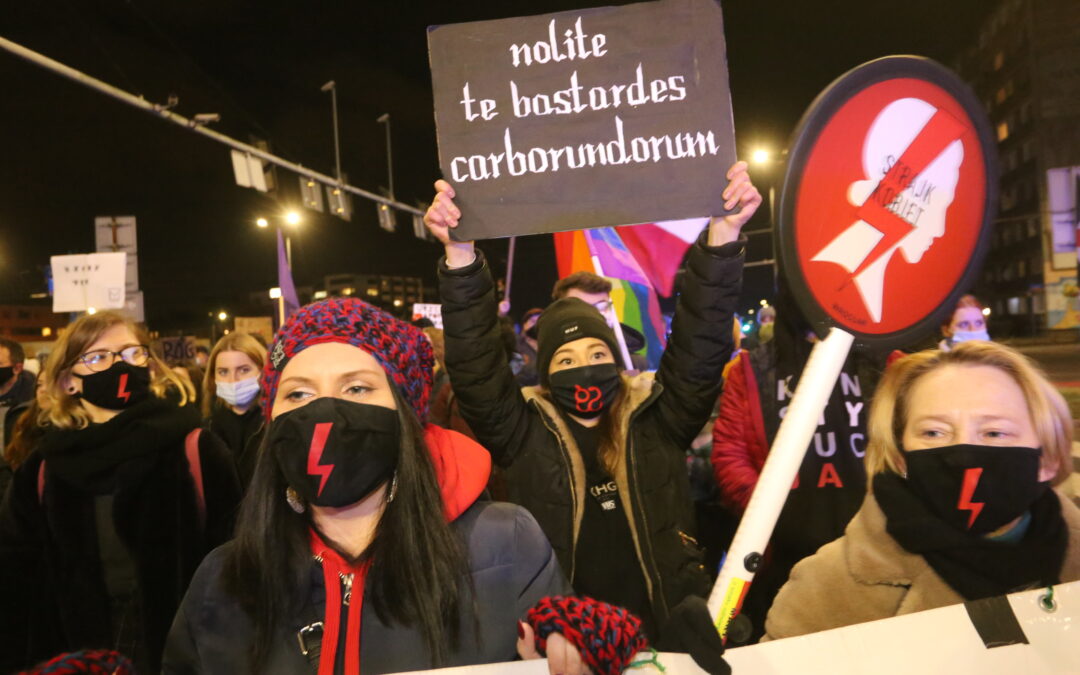Mass protests have once again erupted on the streets of Poland, after the government today finally moved to bring into force a court ruling that would introduce an almost complete ban on abortion in the country.
The ruling was issued by the Constitutional Tribunal in late October. It declared terminations in the case of foetal defects – which make up around 98% of all legal abortions in Poland – to be unconstitutional.
However, the tribunal’s judgements only enter into force once they are published by the government in the official Journal of Laws. The deadline for that to happen was 2 November, but the government failed to do so.
It claimed that more time was needed for “dialogue”. The court’s decision – which polls show is opposed by a large majority of the public – had prompted the largest demonstrations in Poland’s post-communist history.
Much of the protesters’ anger was directed against the ruling Law and Justice (PiS) party rather than the court itself, which is widely seen as being under the government’s influence. A contested judicial overhaul in 2016 saw PiS engineer its own judges onto the court, including appointing a close associate of party chairman Jarosław Kaczyński as chief justice.
The government also said last year that publication of the ruling could be delayed until the tribunal released its full justification (an argument rejected by legal scholars, who say that the government acted unconstitutionally by delaying implementation of the ruling).
Today, the Constitutional Tribunal finally published its justification. In the 154-page text, it argued that “a child not yet born [is] a human being” and therefore deserves protection under the constitution’s decree that “Poland shall ensure the legal protection of the life of every human being”.
The justification of the ruling on Poland’s abortion law by the illegally-constituted Const. Tribunal has been published. The ruling refers to embriopathological abortion as “eugenic practices”, despite the fact that nobody is compelled against their will to have an abortion. pic.twitter.com/fofslBUh8v
— Ben Stanley (@BDStanley) January 27, 2021
After news of the justification emerged, the government’s spokesman confirmed that it would be published today in the Journal of Laws, bringing it into force.
Some commentators have noted that the ruling could still be interpreted in a way that does not eliminate all abortions justified by foetal defects. It may be possible, for example, for a doctor to argue that giving birth to a child with a severe defect could harm the mother’s physical or mental health, which would make a termination permissible.
Yet however it is interpreted, the ruling will make Poland’s abortion law – already the strictest in the European Union apart from Malta’s – even tougher. And it is likely to significantly reduce the already relatively low number of legal abortions (around 1,000 of which are performed annually).
In response to today’s developments, Women’s Strike (Strajk Kobiet) – the organisation that coordinated last autumn’s mass protests – called on Poles to return to the streets to demonstrate against the ruling.
“Let’s make hell for them that they will remember for the rest of their lives,” tweeted the organisation. Women’s Strike declared the ruling to be illegitimate and its leader, Marta Lempart, threatened to take legal action against any doctor refusing to perform abortions based on the judgement.
Within a few hours, crowds of thousands had gathered in many cities and towns, including Warsaw, Wrocław, Poznań and Kraków. In the autumn, the government warned that such gatherings would spread the coronavirus, though in fact infections subsequently began to fall.
#StrajkKobiet wchodzi na rondo Dmowskiego w centrum Warszawy. pic.twitter.com/sJWxBpjgMR
— Marcin Terlik (@MarcinTerlik) January 27, 2021
In the capital, a crowd of around a thousand gathered outside the Constitutional Tribunal before moving towards PiS headquarters. They held banners declaring “Freedom of choice instead of terror” and “This is war”.
The protests also received support from opposition politicians. Former prime minister Donald Tusk called for the “defence of [women’s] rights and dignity against the cynical fanaticism of the authorities”.
A group of MPs from The Left, Poland’s second largest opposition group, joined the demonstration outside the Constitutional Tribunal and called on centrist and centre-right opposition parties to join them in opposing the restrictions on abortion.
Jesteśmy pod TK. Jesteśmy z Wami. Dziś nie można czekać na lepsze czasy, trzeba działać teraz. Wzywamy @Platforma_org, @nowePSL, @pl_2050 oraz wszystkich posłów, którzy mają sumienie do poparcia ustawy raunkowej @__Lewica! #poslankiLewicy #LegalnaAborcjaBezKompromisów pic.twitter.com/G96EAlaHb6
— Magda Biejat (@MagdaBiejat) January 27, 2021
Last autumn’s mass protests – which saw hundreds of thousands of people take to the streets – were largely peaceful. However, some participants vandalised Catholic churches and disrupted masses in late October, and also clashed with nationalists who had gathered to defend churches.
As the protests progressed into November, police began to use increasingly heavy-handed tactics against them. Officers – often in plain clothes – deployed batons and tear gas.
They claimed to be responding to aggression from the crowds, but activists and opposition MPs accused the police of unjustified and wanton use of force.
Main image credit: Krzysztof Cwik / Agencja Gazeta

Daniel Tilles is editor-in-chief of Notes from Poland. He has written on Polish affairs for a wide range of publications, including Foreign Policy, POLITICO Europe, EUobserver and Dziennik Gazeta Prawna.




















